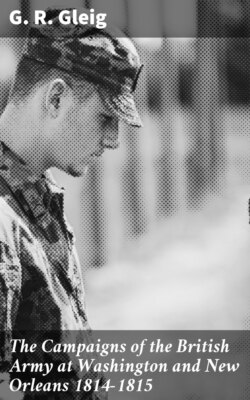Читать книгу The Campaigns of the British Army at Washington and New Orleans 1814-1815 - G. R. Gleig - Страница 15
На сайте Литреса книга снята с продажи.
CHAPTER IV. AT SEA
ОглавлениеTHE land army, destined for the invasion of the United States, which took shipping at this period in the Garonne, consisted but of three battalions of infantry, the 4th, 44th, and 85th regiments; the two former mustering each about eight hundred bayonets, the last not more than six hundred. In addition to these, there were two officers of engineers, a brigade of artillery, a detachment of sappers and miners, a party of artillery drivers, with a due proportion of officers belonging to the Medical and Commissariat departments. The whole together could not be computed at more than two thousand five hundred men, if indeed it amounted to so great a number; and was placed under the command of Major-General Ross, a very gallant and experienced officer.
The fleet, again, consisted of the Royal Oak, of 74 guns, bearing the flag of Rear-Admiral Malcolm; the Diadem and Dictator, two sixty-fours, armed en flute; the Pomone, Menelaus, Trave, Weser, and Thames, frigates, the three last armed in the same manner as the Diadem and Dictator; the Meteor and Devastation, bomb-vessels; together with one or two gun-brigs, making in all a squadron of eleven or twelve ships of war, with several storeships and transports.
On board the Royal Oak were embarked the General, with his staff, and the artillery; the Trave and Weser were filled with the 4th; the 44th were divided between the Dictator and the Thames, in the first of which ships were also the engineers; the 85th occupied the Diadem; and the rest were scattered through the fleet, partly in the men-of-war and partly in the transports.
As soon as the troops, with all their baggage, were finally settled in the vessels allotted for their accommodation, the signal was made to weigh; but the wind being adverse, and the navigation of the Garonne far from simple, it could not be obeyed with safety. Every thing, therefore, remained quiet till the evening of the 2nd of June, when the gale moderating a little, the anchors were raised and the sails hoisted. The tide was beginning to ebb when this was done, favoured by which the ships drifted gradually on their course; but before long, the breeze shifting, blew directly in their sterns, when they stood gallantly to sea, clearing the river before dark; and, as there was no lull during the whole of the night, by daybreak the coast of France was not to be discerned. All was now one wide waste of waters, as far as the eye could reach, bounded on every side by the distant horizon; a scene which, though at first it must strike with awe and wonder a person unaccustomed to it, soon becomes insipid, and even wearisome, from its constant sameness.
